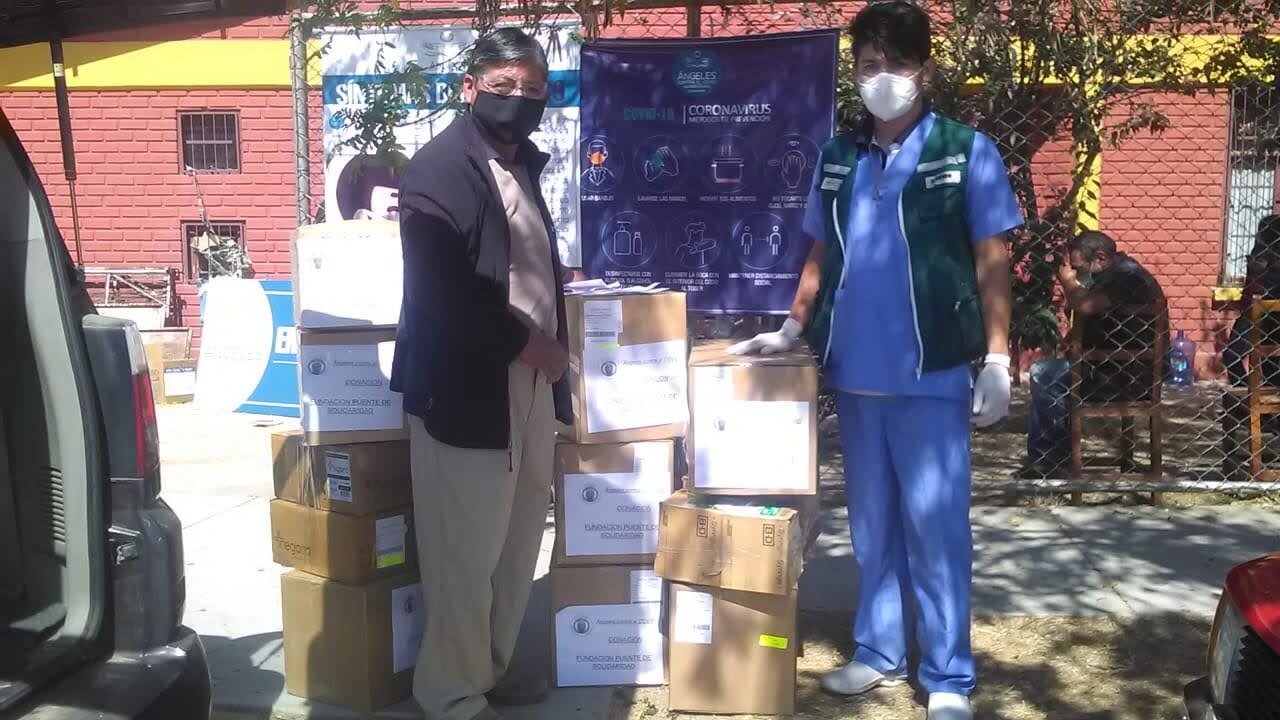The Edges are the Center
Pope Francis continually urges all of us to give priority to those on our margins. He draws our attention away from those people and places that society centers, and moves our focus toward those on our edges—those who are sick or impoverished, those whom society has otherwise failed. This rich invitation gives both form and function to the Solidarity Bridge mission and lies at the heart of our organizational consciousness.
Medical supply distributions from our warehouse in Cochabamba this month have been an important expression of this focus. Our recent delivery of a 40-foot container shipment was the first of what we hope will be at least 6 bulk deliveries made this year. These supplies are a critical influx of materials for a health system that has collapsed under the weight of the pandemic. Our sister organization, Puente de Solidaridad (PdS) has been distributing truckloads of boxes holding surgical supplies, PPE and other items to our partner hospitals. But, they have also seen a surge in requests from other health providers, especially those serving marginalized groups. Because governmental support tends to focus on large institutions, the PdS staff felt called to direct our supplies to a number of smaller organizations known for working at the edges of society.
The very first donation was delivered by PdS staffer, Jose Choque, who drove the supplies loaded in the back of his blue pick-up to the San Jose Home for indigent elderly persons. The Sisters who care for more than 100 elderly patients had posted an urgent plea for help to control a coronavirus outbreak that had already taken the lives of several residents and sickened multiple staff. In addition to delivering supplies, PdS connected the San Jose Home to a network of volunteer doctors.
Many more distributions followed, focused on organizations in the outskirts of the city and those tending to the marginalized. These included:
San Juan de Dios Hospital - A psychiatric hospital in Cochabamba with 116 patients and 13 confirmed COVID infections
Comunidad de San Egidio - providing outreach and care to the homeless
Pastoral Penitenciara - providing basic health care and pastoral outreach to prison inmates
Food for Heroes - volunteers who provide food for doctors, nurses, and other healthcare personnel working in neighborhood health posts and primary level clinics in the outskirts of the city
Centro Pacha - a small health center providing care in the southern area of the city to new rural and urban migrants and other low-income populations
A congregation of nuns serving people from the TIPNIS (indigenous communities living in the tropical region known as Territorio Indígena del Parque Isiboro Sécure)
With virtually all hospitals in Bolivia now over capacity, few are receiving new COVID-19 patients. For that reason, more and more people are treated at small clinics, at home, or wherever else they reside. It’s estimated that 80% of healthcare workers in these primary level settings have contracted COVID-19 due to a lack of PPE.
In addition to filling specific material needs, our partners in Bolivia have stressed that the hospitals, clinics, elder homes, and others have expressed their gratitude simply “for not forgetting them.” As Patricia Vargas, Executive Director of Puente de Solidaridad, has relayed to us, “they are grateful to be seen. They say they feel forgotten by the world—that they are on the bottom of everyone’s list. Through these donations, they feel acknowledged, valued, and less alone.”
When we began planning for our 2020 container shipment one year ago as a regular part of equipping our year-round surgical programs, none of us could have foreseen that basic protective materials would emerge as a central focus of our 2020 work. But with all but emergency surgeries on hold in Bolivia, we are grateful to have the agility to shift resources toward the pandemic response. Thank you to all our donors and supporters for standing with us in this work. In particular, thank you for seeing, acknowledging, and valuing the efforts of the people of Bolivia to reach out to those who have been most marginalized.




